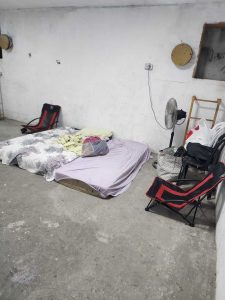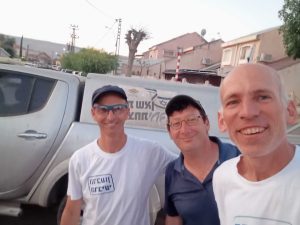Posted on Facebook 18 August 2024
I can’t believe I’m writing about the recurring, daily, deeply emotional moments on the news during the war. I listen to the news quite often and am aware of the discourse regarding the emotional and psychological toll it takes on those who struggle to disconnect. Yet, ever since October 7th, followed by Israel’s military campaign in Gaza and the northern border, two recurring topics always make me emotional.
The first is the time dedicated to discussing our citizens and soldiers who are held captive by Hamas terrorists in Gaza. The news announcers, broadcasters, and talk show hosts all make an effort to share the personal stories of those in captivity, focusing on a different individual each time. This is accompanied by the updated number of individuals held captive (alive and deceased) and the number of days they’ve been in captivity. The emphasis is on the human, personal story, often accompanied by a live or recorded interview or statement from a close family member (parent, spouse, child, etc.). It is both emotional and important. The number of our Israeli captives makes it challenging to keep track of and stay updated on everyone.”
Maimonides rules in Mishneh Torah, Fasts 1:1-3:
“It is a positive Torah commandment to cry out and to sound trumpets in the event of any difficulty that arises which affects the community, as [Numbers 10:9] states: ‘When you go out to war… against an enemy who attacks you, you shall sound the trumpets….’ This commandment is not restricted to such a limited scope; rather, the intent is: Whenever you are distressed by difficulties—e.g., famine, plague, locusts, or the like—cry out [to God] because of them and sound the trumpets.”
Our Sages teach us in the Babylonian Talmud, Ta’anit 11a:
“When the community is immersed in suffering, a person may not say: ‘I will go to my home, and I will eat and drink, and peace be upon you, my soul…’ Rather, a person should be distressed together with the community. As we found with Moses, our teacher, who was distressed together with the community, as it is stated during the war with Amalek: ‘But Moses’ hands were heavy, and they took a stone and put it under him, and he sat upon it’ (Exodus 17:12). But didn’t Moses have one pillow or one cushion to sit upon? Why was he forced to sit on a rock? Rather, Moses said as follows: ‘Since the Jewish people are immersed in suffering, I too will be with them in suffering, as much as I am able, although I am not participating in the fighting.’ The baraita adds: ‘And anyone distressed together with the community will merit seeing the consolation of the community.'”
As long as we have members of our community held in captivity by Hamas, we, as a community, are suffering. I am personally moved every time the media dedicates time to this, and I am grateful for their efforts in keeping the personal stories on the agenda, preventing me from falling into a mindset of “Eat and drink, and peace be upon you.”
The second is an announcement attached to the weather report a couple of times a day. It begins with the words, “For the soldiers on the frontlines, Meteo-Tech brings you the weather. In Gaza, it will be… on the Lebanese northern border…” The weather report for the soldiers is not only geographically specific but also includes additional information like rain, clouds, and fog.
Many times, I ask myself who these announcements are targeted at. First, I’m not sure the soldiers on the front lines have the time or means to listen to the news. Second, I’m certain they have connectivity and check the weather before they go on missions.
Israel is a small country, and our battlefield is in our backyard. Soldiers on the battlefield, when they get leave, can, within a matter of hours, be sleeping in their own beds at home and eating their mother’s or spouse’s cooking for dinner. The reverse is also true—someone can wake up at home in the morning and, instead of going to work, head to the battlefield. It’s a surreal situation. Take, for example, an American soldier defending their country in Iraq, Afghanistan, Syria, or any other country. They go on tours that can last for months, and when not in the field, they are on base far from home. For Israelis, there’s a certain normalization of this abnormal reality.
Personalizing the weather for our soldiers on the front lines is a reminder to us, the residents of Israel, that the battlefield is not far from us. The weather in the south and north is important, but in Gaza or on the Lebanese border, more specifically, are our soldiers, and on the battlefield, our soldiers are working very hard, and the weather affects them in a different way than it does just any other person in the south or the north.
I remember many times hearing the following story from my teacher and mentor, Avraham Infeld. I bring it to you as it is presented in his book A Passion for a People: Lessons from the Life of a Jewish Educator:
As a child in South Africa, I remember asking my father to explain why we prayed for rain in the summer. It was December, and in synagogue, the prayers included a request for rain, which no child in South Africa wants at that time of year! My father’s answer was very straightforward: “Our rain doesn’t fall in South Africa; it falls in Israel!” Try to grow up normal with an answer like that!
When Israel is under stress and we have many soldiers on the battlefield fighting for our freedom, the only place where the weather is important is on the fronts and the battlefields. Our hearts and prayers are there at all times. I am deeply appreciative of this focus in the daily forecast.
These two brief moments on Israeli radio continue to profoundly touch my heart, reminding me to stay focused on our hostages and soldiers, as I believe I must.



